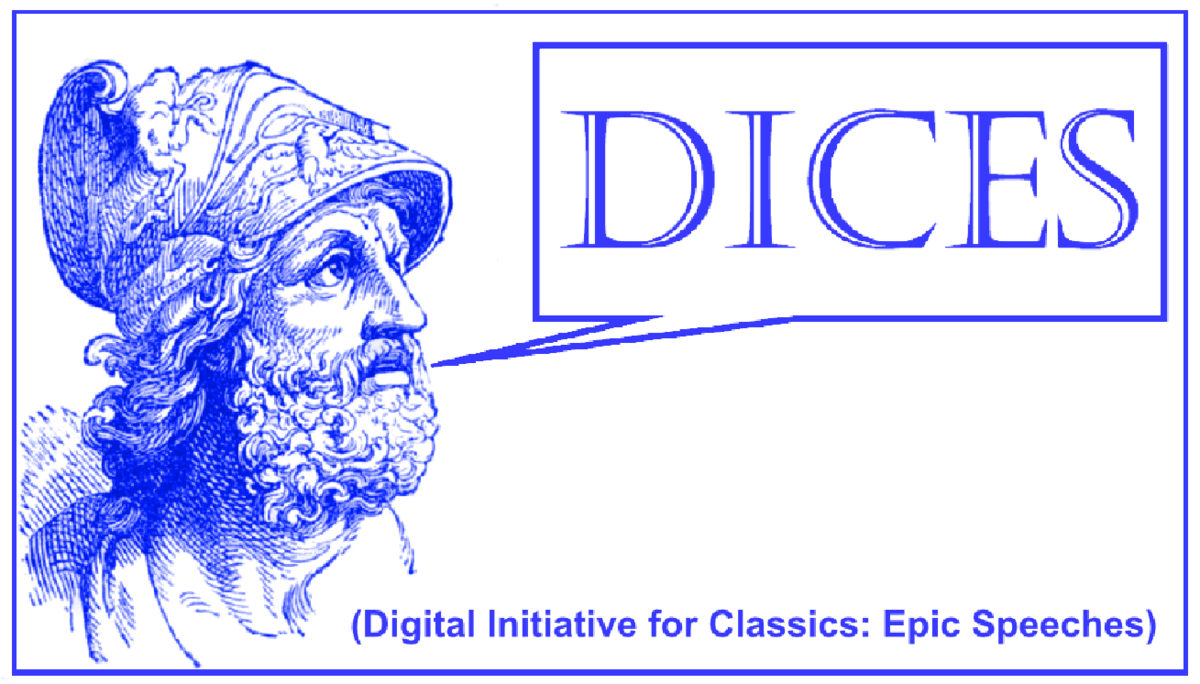About DICES

DICES is an international research collaboration for the study of direct speeches in Greek and Latin epic poetry from Homer to Late Antiquity.
The heart of the project is an effort to construct a comprehensive, authoritative database of direct speech in Greek and Latin epic. Standard identifiers for characters and textual loci permit us to draw on (and contribute to) an extensive ecosystem of linked open data for Classics, further broadening the potential reach of our analysis.
DICES has organised two successive workshops to increase the cohesion of the planned multi-author publication, facilitate cooperation between the participating authors, and to provide training and support for the use of the developed digital tools of the DICES database. The first workshop, at the University of Rostock (Germany), 30 June – 2 July 2022, was used for the presentation of early ideas, forging collaboration and demonstrations of digital tools and methods; the second workshop, at Mount Allison University (Canada), 31 May - 2 June 2023, for presentations of final drafts, troubleshooting, and further brainstorming.
The group is currently collaborating on a peer-reviewed, edited volume showcasing experimental digital methods and new possibilities for diachronic analysis of direct speech and related categories in the epic tradition.
For a more detailed description of the database, please see here.
Objectives
- To generate a comprehensive and openly accessible authoritative data corpus that introduces a new standard for the study of direct speech in ancient and late antique epic
- To develop an effective, freely and long-term accessible digital research tool and scalable analytical platform for storing, accessing, analysing, and visualizing this data corpus and the complex heterogenous relationships between its individual entries, that will provide lasting benefits to students and scholars working in the field of discourse analysis and narratology in Graeco-Roman epic but also the national and international academic community at large
- To render future quantitative work in this field more transparent, comparable, and easier to recreate through a unified system of calculation and speech classification
- To advance the study of discourse analysis and narratology in Graeco-Roman epic and help facilitate a great variety of synchronic and diachronic approaches to speech representation in epic poetry
- To help unite disparate data sets through national and international cooperation and transparency
- To achieve a greater standardisation and connectivity of projects and data on direct speech in Graeco-Roman epic as well as digital initiatives in related fields
- To contribute to a greater understanding of the poetic contributions of Late Antiquity and to the integration of late antique texts and Digital Humanities initiatives for Classics
- To not simply recapitulate the traditional methods of philology, but to empower scholars to ask entirely new kinds of questions about large and diverse data corpora
- To train leading and emerging scholars in Classics and neighbouring disciplines in the use of digital technology and help them build a new expertise in the Humanities to encourage and support their approach to this strongly emerging discipline.
Project Team
- Christopher W. Forstall, Mount Allison University, Canada
- Berenice Verhelst, University of Amsterdam, Netherlands
- Simone Finkmann, University of Rostock, Germany (until 2022)
Technical Collaborators
- Karsten Labahn, University of Rostock, Digital Library Division
- Robert Stephan, University of Rostock, Digital Library Division
Student Research Assistants
2021:
- Jule Andreeßen
- Yonathan Bernhardt
- Mathijs Clement
- Dawson Fraser
- Merle Kallet
- Anne Lautenschlager
- Wyatt Stagg
- Annik Tiede
- Vic Vandendriessche
- Jarno Vercamer
- Ava Waugh
2022:
- Jule Andreeßen
- Sara Didriksen
- Merle Kallet
- Marie Kisser
- Anne Lautenschlager
- Wyatt Stagg
- Annik Tiede
- Ava Waugh
2023:
- J.C. Bennet
- Merle Kallet
- Cristina Martin
- Annik Tiede

